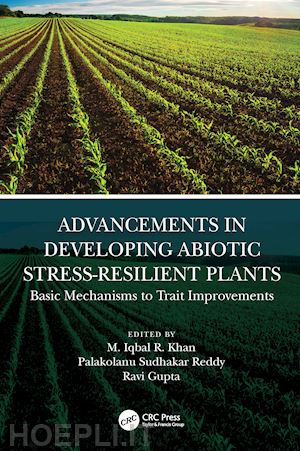Chapter 1 Physiological, Molecular, and Biochemical Responses of Rice to Drought Stress...............................................................................................................1 Ashish B. Rajurkar, Dhananjay Gotarkar, and Seema Rana Chapter 2 Coordinated Functions of Reactive Oxygen Species Metabolism and Defense Systems in Abiotic Stress Tolerance.......................................................23 Swati Sachdev, Priyanka Jaiswal, and Mohammad Israil Ansari Chapter 3 Nitric Oxide- Mediated Salinity Stress Tolerance in Plants: Signaling and Physiological Perspectives..........................................................................................45 Praveen Gupta, Dharmendra Kumar, and Chandra Shekhar Seth Chapter 4 S- Nitrosylation and Denitrosylation: A Regulatory Mechanism during Abiotic Stress Tolerance in Crops...............................................................................65 Priyanka Babuta and Renu Deswal Chapter 5 Calcium Signaling Is a Hub of the Signaling Network in Response and Adaptation of Plants to Heat Stress.............................................................................85 Zhong- Guang Li Chapter 6 Functions of Polyamines in Abiotic Stress Tolerance in Plants..................................97 Peter Palfi, Riyazuddin Riyazuddin, Laszlo Bakacsy, and Agnes Szepesi Chapter 7 Decoding the Multifaceted Role of Glycine Betaine in Heavy Metal Stress Regulation.................................................................................................................119 Harsimran Kaur, Sukhmeen Kaur Kohli, Sakshi Sharma, and Renu Bhardwaj Chapter 8 Abiotic Stress and Its Role in Altering the Nutritional Landscape of Food Crops............................................................................................................141 Veda Krishnan*, Muzaffar Hasan, Monika Awana, and Archana Singh Chapter 9 Plant Transcription Factors from Halophytes and Their Role in Salinity and Drought Stress Tolerance....................................................................................169 Priyanka S. Joshi, Ankita Dave, Parinita Agarwal, and Pradeep K. Agarwal Chapter 10 Plant Abiotic Stress Tolerance on the Transcriptomics Atlas....................................193 Geetha Govind, Jayant Kulkarni, Harshraj Shinde, Ambika Dudhate, Ashish Srivastava, and P. Suprasanna Chapter 11 Deciphering the Molecular Mechanism of Salinity Tolerance in Halophytes Using Transcriptome Analysis...............................................................237 Tejas C. Bosamia, Doddabhimappa R. Gangapur, Parinita Agarwal, and Pradeep K. Agarwal Chapter 12 Seed Aging in Crops: A Proteomics Perspective.......................................................255 Truong Van Nguyen, Ravi Gupta, Sun Tae Kim, and Cheol Woo Min Chapter 13 Crop Proteomics: Towards Systemic Analysis of Abiotic Stress Responses............265 Asmat Farooq, Rakeeb Ahmad Mir, Vikas Sharma, Mohammad Maqbool Pakhtoon, Kaiser Ahmad Bhat, Ali Asgar Shah, and Sajad Majeed Zargar Chapter 14 Metabolites and Abiotic Stress Tolerance in Plants..................................................287 Radha Mishra and Indresh Kumar Pandey Chapter 15 Genome Editing for Developing Abiotic Stress- Resilient Plants..............................305 Debajit Das, Sanjeev Kumar, Saradia Kar, Channakeshavaiah Chikkaputtaiah, and Dhanawantari L. Singha Chapter 16 Molecular Breeding in Rice for Abiotic Stress Resilience: The Story since 2004.................................................................................................329 Wricha Tyagi, James M., Magudeeswari P., and Mayank Rai Chapter 17 Nanotechnology in Developing Abiotic Stress Resilience in Crops: A Physiological Implication......................................................................................351 Satyen Mondal, Md. Ruhul Quddus, Tuhin Halder, M. Ashik Iqbal Khan, Guanglong Zhu, M. Rafiqul Islam, and Tofazzal Islam Index...............................................................................................................................................371











